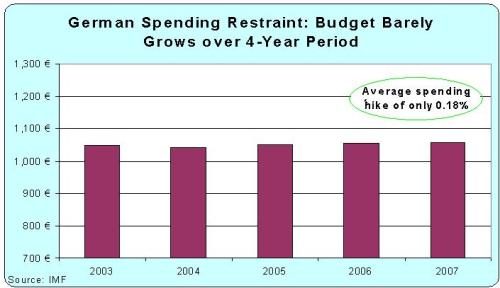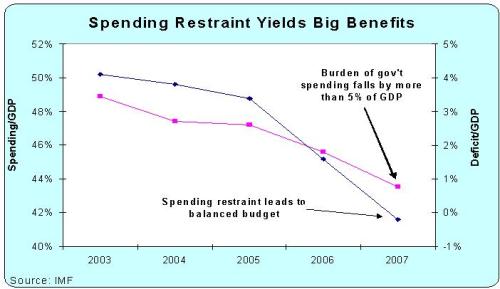Germany isn’t exactly a fiscal role model.
Tax rates are too onerous and government spending consumes about 44 percent of economic output.
That’s even higher than it is in the United States, where politicians at the federal, state, and local levels divert about 39 percent of GDP into the public sector.
Germany also has too much red tape and government intervention, which helps to explain why it lags other European nations such as Denmark and Estonia in the Economic Freedom of the World rankings.
But I have (sort of) defended Germany a couple of times, at least on fiscal policy, explaining that the Germans didn’t squander much money on Keynesian spending schemes during the downturn and also explaining that Paul Krugman was wrong in his column on Germany and austerity.
also explaining that Paul Krugman was wrong in his column on Germany and austerity.
Today, though, I’m going to give Germany some unambiguous praise.
If you look at last decade’s fiscal data, you’ll see that our Teutonic friends actually followed my Golden Rule on fiscal policy for a four-year period.
Here’s a chart, based on IMF numbers, showing total government spending in Germany from 2003-2007. As you can see, German policy makers basically froze spending.
I realize that I’m a libertarian and that I shouldn’t be happy unless the burden of spending is being dramatically reduced, but we’re talking about the performance of European politicians, so I’m grading on a curve.
By that standard, limiting spending so it grows by an average of 0.18 percent is rather impressive. Interestingly, this period of fiscal discipline began when the Social Democrats were in power.
Recommended
And because the economy’s productive sector was growing at a faster rate during this time, a bit more than 2 percent annually, the relative burden of government spending did fall.
The red line in this next chart shows that the public sector, measured as a share of economic output, fell from almost 49 percent of GDP to less than 44 percent of GDP.
It’s also worth noting that this four-year period of spending restraint also led to a balanced budget, as shown by the blue line.
In other words, by addressing the underlying problem of too much government, the German government automatically dealt with the symptom of red ink.
That’s the good news.
The bad news is that the German government wasn’t willing to sustain this modest degree of fiscal discipline. The Christian Democrats, who took office in mid-2005, allowed faster spending growth beginning in 2008. As I noted above, the budget increases haven’t been huge, but there’s been enough additional spending that Germany no longer is complying with the Golden Rule and the burden of the public sector is stuck at about 44 percent of GDP.
The moral of the story is that Germany shows that good things happen when spending is restrained, but long-run good performance requires long-run spending discipline.
 That’s why I’m a fan of Switzerland’s spending cap. It’s called the “debt brake,” but it basically requires politicians to limit spending so that the budget doesn’t grow much faster than inflation plus population.
That’s why I’m a fan of Switzerland’s spending cap. It’s called the “debt brake,” but it basically requires politicians to limit spending so that the budget doesn’t grow much faster than inflation plus population.
And that’s why Switzerland has enjoyed more than a decade of good policy.
To see other examples of nations that have enjoyed fiscal success with period of spending restraint, watch this video.
The Canadian example is particularly impressive.



























Join the conversation as a VIP Member